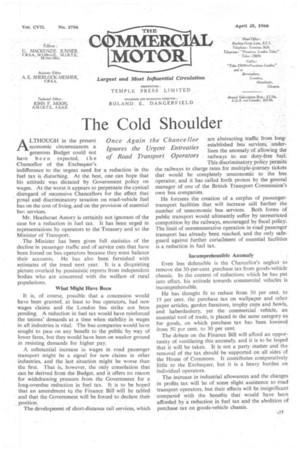The Cold Shoulder
Page 27

If you've noticed an error in this article please click here to report it so we can fix it.
ALTHOUGH in the present economic circumstances a generous Budget could not have been expected, the Chancellor of the Exchequer's indifference to the urgent need for a reduction in the fuel tax is disturbing. At the best, one can hope that his attitude was dictated by Government policy on wages. At the worst it appears to perpetuate the cynical disregard of successive Chancellors for the effect that penal and discriminatory taxation on road-vehicle fuel has on the cost of living, and on the provision of essential bus services.
Mr. Heathcoat Amory is certainly not ignorant of the case for a reduction in fuel tax. It has been urged in representations by operators to the Treasury and to the Minister of Transport.
The Minister has been given full statistics of the decline in passenger traffic and of service cuts that have been forced on bus operators because they must balance their accounts. He has also been furnished with estimates of the trend next year. It is a disquieting picture overlaid by pessimistic reports from independent bodies who are concerned with the welfare of rural populations.
What Might Have Been It is, of course, possible that a concession would have been granted, at least to bus operators, had new wages claims and the London bus strike not been pending. A reduction in fuel tax would have reinforced the unions' demands at a time when stability in wages in all industries is vital. The bus companies would have sought to pass on any benefit to the public by way of lower fares, but they would have been on weaker ground in resisting demands for higher pay.
A substantial increase in wages in road passenger transport might be a signal for new claims in other industries, and the last situation might be worse than the first. That is, however, the only consolation that can be derived from the Budget, and it offers no reason for withdrawing pressure from the Government for a long-overdue reduction in fuel tax. It is to be hoped that an amendment to the Finance Bill will be tabled and that the Government will be forced to declare their position.
The development of short-distance rail services, which are abstracting traffic from longestablished bus services, .underlines the anomaly of allowing the railways to use duty-free fuel. This discriminatory policy permits the railways to charge rates for multiple-journey tickets that would be completely uneconomic to the bus operator, and it has called forth protest by the general manager of one of the British Transport Commission's own bus companies.
He foresees the creation of a surplus of passengertransport facilities that will increase still further the number of uneconomic bus services. Both forms of public transport would ultimately suffer by unrestricted competition by the railways, encouraged by fiscal policy. The limit of unremunerative operation in road passenger transport has already been reached, and the only safeguard against further curtailment of essential facilities is a reduction in fuel tax.
Incomprehensible Anomaly Even less defensible is the Chancellor's neglect to remove the 30-per-cent. purchase tax from goods-vehicle chassis. In the context of reductions which he has put into effect, his attitude towards commercial vehicles is incomprehensible.
He has thought fit to reduce from 30 per cent. to 15 per cent. the purchase tax on wallpaper and other paper articles, garden furniture, trophy cups and bowls, and haberdashery, yet the commercial vehicle, an essential tool of trade, is placed in the same category as, fur goods, on which purchase tax has been lowered from 50 pr cent. to 30 per cent.
The debate on the Finance Bill will afford an opportunity of ventilating this anomaly, and it is to be hoped that it will be taken. It is not a party matter and the removal of the tax should be supported on all sides of the House of Commons. It contributes comparatively little to the Exchequer, but it is a heavy burden on individual operators.
The increase in industrial allowance and the changes in profits tax will be of some slight assistance to road transport operators, but their effects will be insignificant compared with the benefits that would have been afforded by a reduction in fuel tax and the abolition of purchase tax on goods-vehicle chassis.




































































































